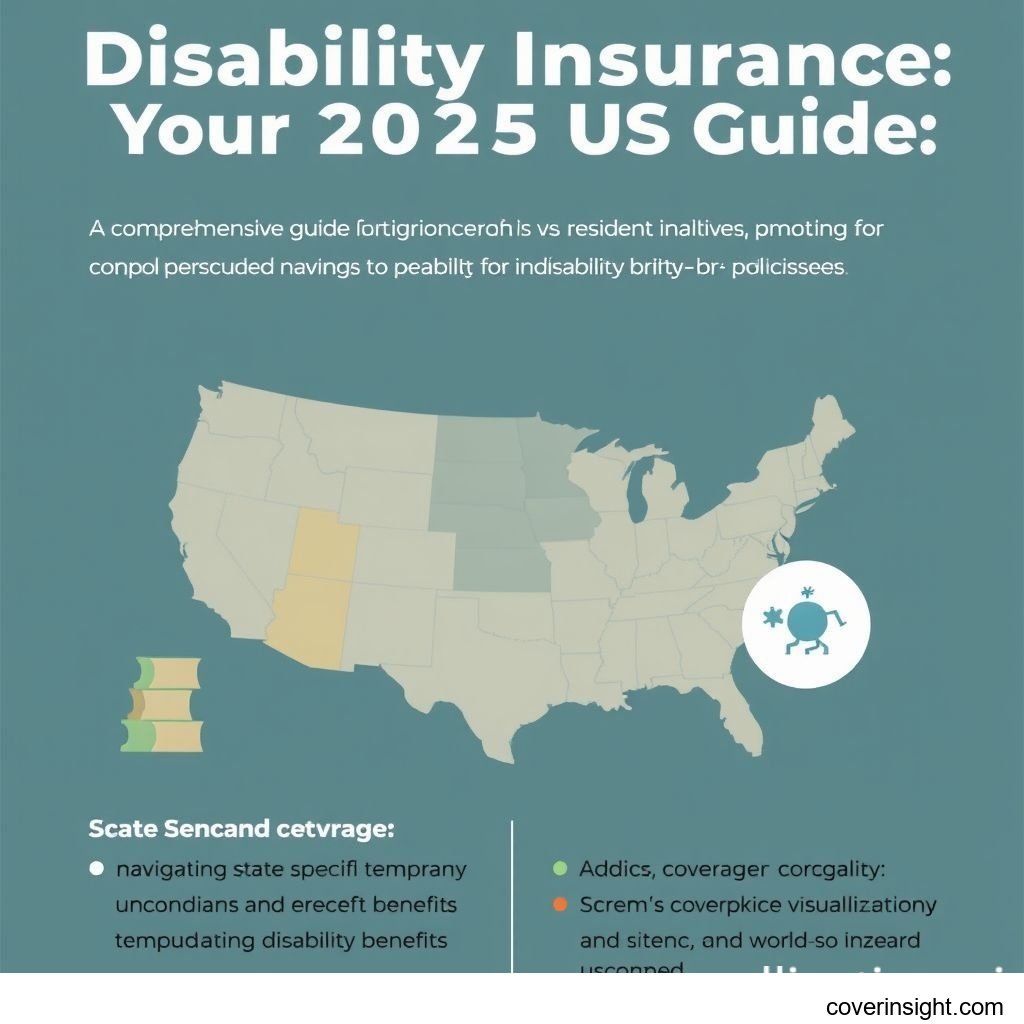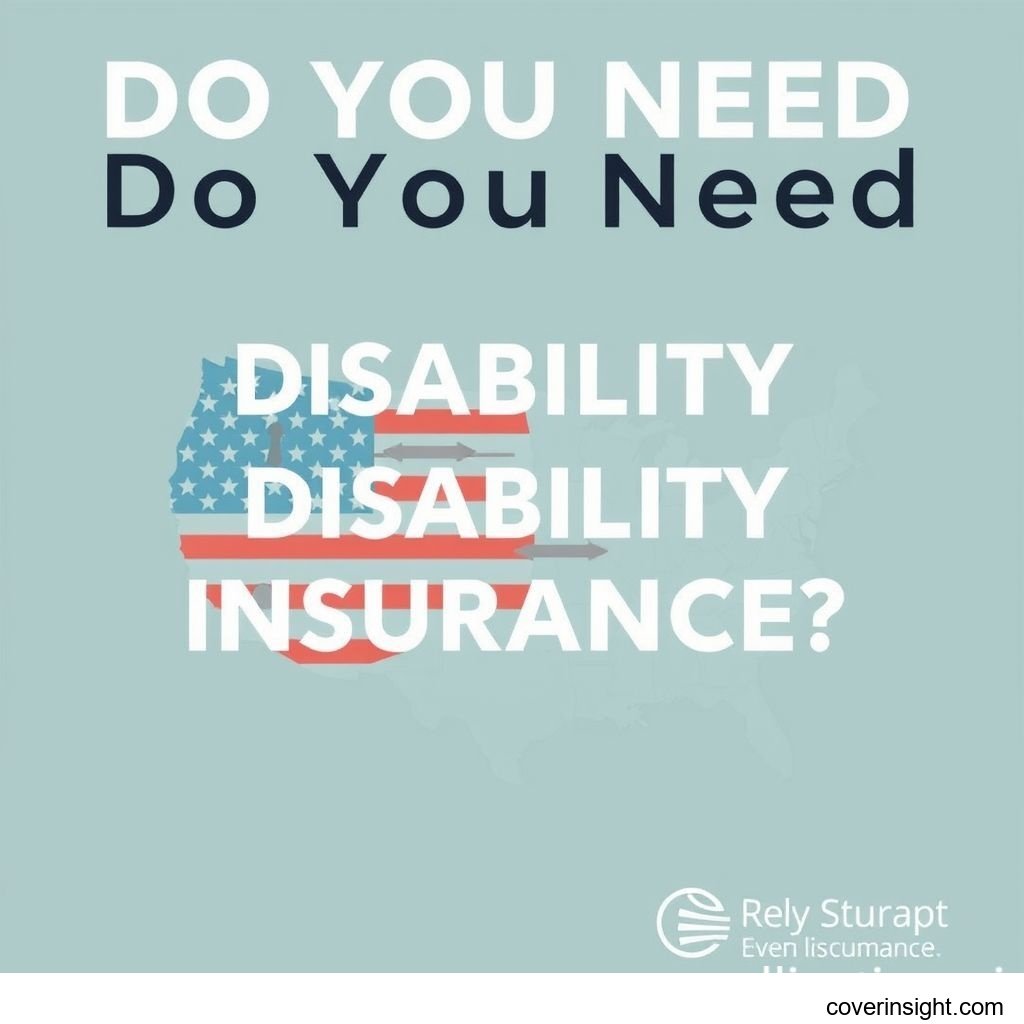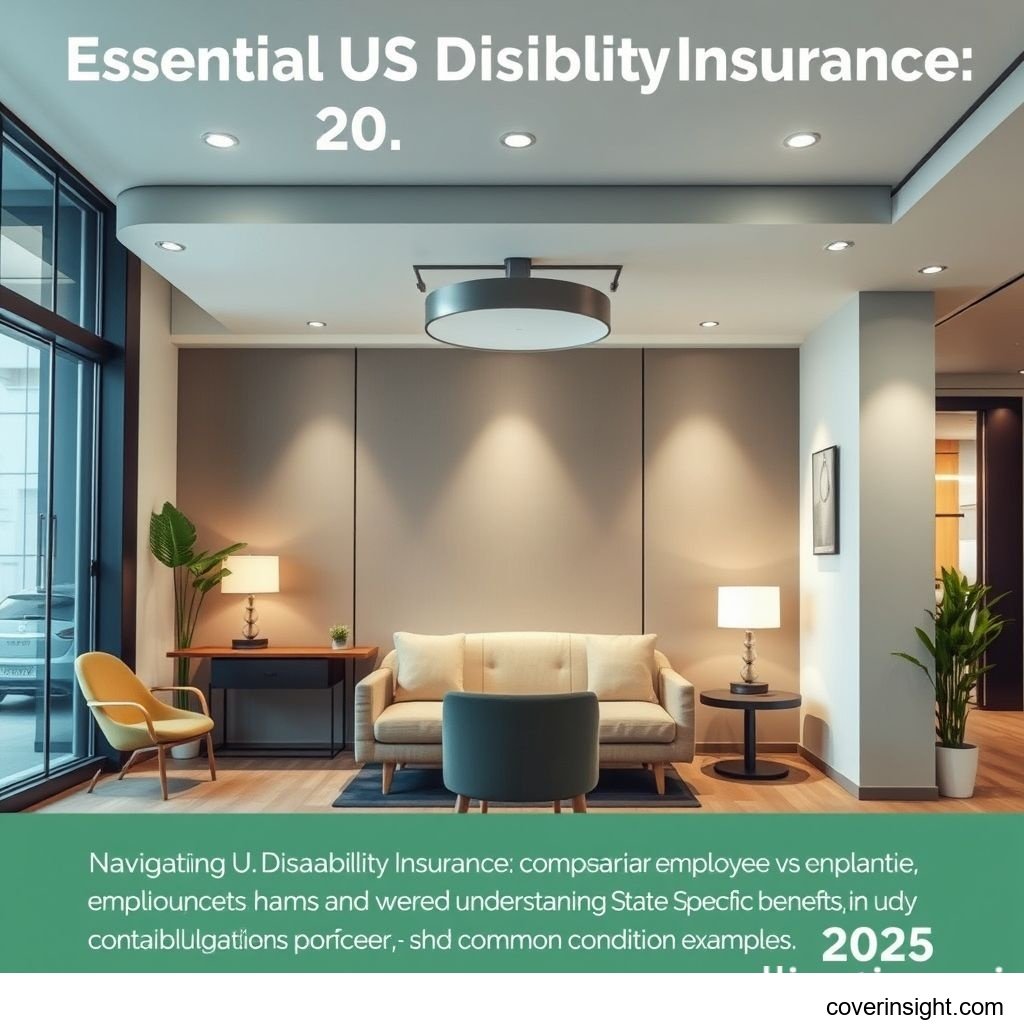Introduction
As 2025 unfolds, securing your financial future remains a paramount concern for US households and professionals. A sudden illness or injury can derail even the most meticulously planned financial strategies, leaving you unable to work and earn an income. This is where disability insurance steps in, offering a vital safety net. Understanding the nuances of policies, including how to manage your coverage, is crucial. For many, the process begins with a simple yet essential step: the guardian disability insurance login. This guide aims to provide a comprehensive overview of disability insurance in the US for 2025, detailing coverage, costs, and how to effectively utilize your online access for managing your policy and understanding your benefits.
Coverage Details
Disability insurance serves as income protection, replacing a portion of your earnings if you become unable to work due to a qualifying disability. It's an indispensable component of a robust financial plan, safeguarding your lifestyle and financial commitments.
What’s Included
A typical disability insurance policy provides a range of benefits designed to support you during a period of incapacitation. Policies vary, but core inclusions generally cover:
-
Benefit Amount: A predetermined percentage of your pre-disability income, often ranging from 60% to 80%. This amount helps cover essential living expenses like mortgage payments, utilities, and groceries.
-
Waiting Period (Elimination Period): The time between when your disability begins and when benefit payments start. Common periods are 30, 60, 90, or 180 days. Longer waiting periods typically result in lower premiums.
-
Benefit Period: The maximum length of time you can receive benefits. This can range from a few years (e.g., 2, 5, or 10 years) up to age 65 or 67, or even for life, depending on the policy. Long-term policies are crucial for sustained financial protection.
-
Definition of Disability: Policies define what constitutes a disability.
-
Own Occupation: Pays if you cannot perform the duties of your specific job, even if you can work in another occupation.
-
Any Occupation: Pays only if you cannot perform the duties of any occupation for which you are reasonably suited by education, training, or experience.
-
-
Partial Disability Benefits: Payments for when you can work but only on a reduced basis, resulting in lost income.
-
Rehabilitation Benefits: Coverage for vocational training or rehabilitation programs designed to help you return to work.
Common Exclusions
While disability insurance offers broad protection, it's essential to be aware of standard exclusions that may limit coverage. Understanding these helps manage expectations and choose the right policy. Common exclusions often include:
-
Pre-existing Conditions: Disabilities directly caused by conditions that existed before the policy was issued, especially if not disclosed or managed properly.
-
Self-inflicted Injuries: Disabilities resulting from intentional self-harm.
-
War or Acts of War: Injuries or illnesses sustained in a declared or undeclared war.
-
Criminal Activity: Disabilities incurred while committing a felony or other illegal acts.
-
Normal Pregnancy and Childbirth: While complications from pregnancy might be covered, standard maternity leave is typically not.
-
Mental Health Conditions: Some policies may have limitations or specific riders for mental health or substance abuse conditions. It's vital to check the policy's specific wording.
Cost Analysis
The cost of disability insurance premiums can vary significantly based on individual circumstances and policy choices. Understanding these factors is key to securing affordable and effective coverage.
Price Factors
Several elements directly influence the premium you will pay for disability insurance. Knowing these can help you adjust your policy to fit your budget. Key price factors include:
-
Age: Younger applicants generally pay lower premiums, as they are less likely to experience a disability.
-
Health: Your current health status, medical history, and lifestyle (e.g., smoking, high blood pressure) significantly impact rates.
-
Occupation: High-risk professions (e.g., construction, manual labor) typically incur higher premiums than white-collar jobs due to increased likelihood of injury.
-
Income: Policies that offer a higher percentage of income replacement will naturally cost more.
-
Benefit Period: Longer benefit periods (e.g., to age 65) lead to higher premiums.
-
Waiting Period: Shorter waiting periods (e.g., 30 days) result in higher premiums, as benefits start sooner.
-
Riders: Additional features like a future purchase option,
cost of living adjustments(COLA), or partial disability riders increase the premium. -
Gender: Historically, women have paid higher premiums due to higher claims rates, though some states have moved towards gender-neutral pricing.
Saving Tips
Reducing the cost of your disability insurance doesn't mean sacrificing essential coverage. Smart choices can lead to significant savings. Consider these tips:
-
Increase Your Waiting Period: Opting for a longer waiting period (e.g., 90 or 180 days instead of 30) can substantially lower your premiums, assuming you have sufficient emergency savings to cover that initial period.
-
Choose a Shorter Benefit Period: While longer periods offer more security, a 5 or 10-year benefit period is more affordable than coverage to age 65 or for life.
-
Bundling Policies: Some insurers offer discounts if you purchase multiple policies (e.g., life and disability insurance) from them. Inquire about such opportunities when you conduct your guardian disability insurance login process.
-
Maintain Good Health: A healthy lifestyle can lead to lower premiums over time, as insurers reward lower risk.
-
Review Your Policy Regularly: As your income and financial obligations change, periodically review your policy to ensure it still meets your needs without being over-insured. This can often be done conveniently through your guardian disability insurance login portal.
-
Employer-Sponsored Plans: If your employer offers group disability insurance, it’s often a cost-effective option, though it might not provide as comprehensive coverage as an individual policy.
Navigating the Claims Process with Guardian Disability Insurance Login
When disability strikes, the claims process can seem daunting. However, knowing the steps and utilizing online tools like the guardian disability insurance login portal can streamline the experience, making it less stressful during a challenging time.
Filing a Claim
Initiating a disability claim requires prompt action and thorough documentation. Here's a general outline:
-
Notify Your Insurer Promptly: Contact your insurance provider as soon as a qualifying disability occurs. Delays can impact your benefit payments.
-
Gather Necessary Documentation: You'll need medical records, physician statements detailing your diagnosis and limitations, and employment information. For specific instructions, log into your guardian disability insurance login account to review their claims submission guidelines.
-
Complete Claim Forms: Your insurer will provide specific forms that need to be filled out by you, your employer, and your treating physician. Ensure all sections are completed accurately and legibly.
-
Submit Your Claim: Once all documentation is gathered, submit it according to your insurer's instructions. Many providers, including Guardian, offer secure online submission through your guardian disability insurance login portal, which can expedite the process.
-
Cooperate with Reviews: The insurer may require independent medical examinations or additional information to assess your claim. Cooperate fully to ensure a smooth evaluation.
Appealing a Decision
If your disability claim is denied, it's not necessarily the end of the road. You have the right to appeal the decision.
-
Understand the Reason for Denial: The insurer must provide a clear reason for the denial. Review this carefully to understand their rationale.
-
Gather Additional Evidence: If the denial was due to insufficient medical information, consult your doctor to provide more detailed reports or clarify existing ones.
-
Submit a Formal Appeal: Follow the insurer's appeal process, which usually involves submitting a written appeal with new supporting documentation. For Guardian policies, specific instructions and forms are often available after your guardian disability insurance login.
-
Seek Professional Help: Consider consulting a disability attorney or advocate. They can help navigate the complexities of the appeals process and represent your interests.
Understanding Tax Implications and Cost of Living Adjustments
Two critical aspects of disability insurance that policyholders often overlook are the tax implications of benefits and the importance of cost of living adjustments (COLA). Understanding these can significantly impact your long-term financial security.
Tax Implications of Benefits
The tax implications of benefits from disability insurance vary depending on who paid the premiums. This is a crucial point to understand when setting up your policy and planning for future income.
-
Employer-Paid Premiums: If your employer pays your disability insurance premiums, the benefits you receive when disabled are generally considered taxable income by the IRS. This means you will need to pay income tax on the disability payments you receive.
-
Employee-Paid Premiums (After-Tax): If you pay your disability insurance premiums yourself with after-tax dollars, the benefits you receive are typically tax-free. This is a significant advantage, as your full benefit amount will be available to cover your expenses. Many financial advisors recommend individual policies paid with after-tax money precisely for these
tax implications of benefits. -
Pre-Tax Contributions: If you pay your premiums with pre-tax dollars (e.g., through a cafeteria plan), your benefits will be taxable. It's always wise to consult a tax professional regarding your specific
tax implications of benefitsto ensure compliance and optimize your financial strategy.
Cost of Living Adjustments (COLA)
A cost of living adjustments (COLA) rider is an optional feature in many long-term disability policies that can significantly enhance the value of your benefits over time.
-
Protecting Purchasing Power: If you become disabled for an extended period, inflation can erode the purchasing power of a fixed monthly benefit. A COLA rider ensures that your benefit payments increase annually by a certain percentage (e.g., 2% or 3%) or in line with a consumer price index. This helps your benefits keep pace with rising living expenses.
-
Long-Term Value: While adding a COLA rider increases your premiums, the long-term protection it offers against inflation can be invaluable, especially for younger individuals who might be on claim for many years. It is a critical consideration for robust financial planning, ensuring your future
cost of living adjustmentsneeds are met. -
Availability: Not all policies offer a COLA rider, and its terms can vary. When exploring options or reviewing your policy through your guardian disability insurance login, inquire about the availability and specifics of
cost of living adjustments.
Choosing Your Guardian Disability Insurance Policy and Maximizing Your Login Experience
Selecting the right disability insurance policy involves understanding various options and leveraging digital tools to manage your coverage. The guardian disability insurance login portal is a key resource for policyholders.
Policy Types and Riders
Beyond the basic coverage, understanding different policy types and available riders can help you tailor a policy that perfectly fits your needs.
-
Own-Occupation vs. Any-Occupation: As mentioned, "own-occupation" is generally more expensive but provides broader protection, paying if you cannot perform your specific job. "Any-occupation" is less costly but only pays if you cannot perform any suitable job.
-
Non-Cancellable & Guaranteed Renewable: This robust policy feature means your insurer cannot cancel your policy, raise your premiums, or change your benefits as long as you pay on time.
-
Conditionally Renewable: The insurer can renew your policy based on certain conditions, such as maintaining employment.
-
Future Increase Option (FIO): Allows you to increase your coverage in the future without additional medical underwriting, ideal for growing incomes.
-
Residual Disability Rider: Pays a partial benefit if you return to work part-time but still experience a loss of income due to your disability.
-
Waiver of Premium: If you become disabled, this rider waives your premium payments while you receive benefits.
Utilizing Your Guardian Disability Insurance Login Portal
The guardian disability insurance login portal is designed to provide policyholders with convenient access to their policy information and services, enhancing the overall experience.
-
Account Management: Securely access your policy details, including benefit amounts, premium schedules, and coverage dates. This central hub allows you to verify your protection at any time.
-
Premium Payments: Make one-time payments, set up recurring payments, or view your payment history with ease. The
guardian disability insurance loginstreamlines financial management. -
Update Information: Keep your contact information, beneficiaries, and other personal details up-to-date, ensuring smooth communication and claim processing.
-
Document Access: Download policy documents, statements, and tax forms as needed. This saves time and ensures you always have access to important records.
-
Claims Tracking: Monitor the status of current claims, upload additional documentation, and communicate with your claims adjuster, all through a secure interface via your guardian disability insurance login.
-
Resources and Support: Find FAQs, educational materials, and contact information for customer service, providing comprehensive support whenever you need it.
FAQs about Guardian Disability Insurance Login
Here are answers to some of the most frequently asked questions regarding disability insurance and utilizing your online access.
How much does guardian disability insurance login cost?
The cost of your Guardian disability insurance policy, accessed via the guardian disability insurance login portal, is highly individualized. It depends on factors such as your age, health, occupation, income, the benefit amount you choose, the waiting period, and any additional riders you select. While a definitive price cannot be given without a quote, premiums can range from 1% to 3% of your annual income for comprehensive coverage. For a precise quote, potential policyholders should contact Guardian directly or through an authorized agent.
What affects premiums?
Premiums are influenced by various factors, including: your age (younger is cheaper), your health (medical history and lifestyle choices), your occupation (riskier jobs cost more), the amount of income you wish to replace, the length of the benefit period, and the duration of the waiting period before benefits begin. Additionally, opting for a more generous definition of disability (like "own occupation") or adding riders such as cost of living adjustments (COLA) will increase your premium.
Is it mandatory?
No, disability insurance is not legally mandatory in the US, unlike auto insurance in most states. However, it is highly recommended by financial experts as a crucial component of a comprehensive financial plan. While Social Security Disability Insurance (SSDI) exists, its eligibility requirements are stringent, and benefits may be insufficient. Many employers offer group disability insurance, but individual policies often provide more robust and personalized coverage.
How to choose?
Choosing the right disability insurance policy involves assessing your financial needs, income, and lifestyle. Start by calculating how much of your income you would need to replace to cover essential expenses. Consider your occupation and health to understand potential premium costs. Evaluate the various definitions of disability, benefit periods, and waiting periods. Research reputable insurers, compare quotes, and read policy details carefully. For Guardian policies, you can explore options and get detailed information before your guardian disability insurance login by contacting their sales department or an independent broker.
Consequences of no coverage?
The consequences of not having adequate disability insurance can be severe. Without it, a disabling illness or injury could lead to significant financial distress, forcing you to deplete savings, incur debt, or even risk losing your home. Your ability to maintain your current lifestyle and meet financial obligations would be severely compromised. Relying solely on government programs like Social Security Disability Insurance might not provide sufficient income replacement, and eligibility can be challenging.
For more general insurance resources, visit Insurance Resources Global. For US-specific insurance guidance, explore US Insurance Home. To understand regulations, consult the National Association of Insurance Commissioners or find specific details through State Insurance Departments. For health insurance information, Healthcare.gov is a valuable resource.









Comments